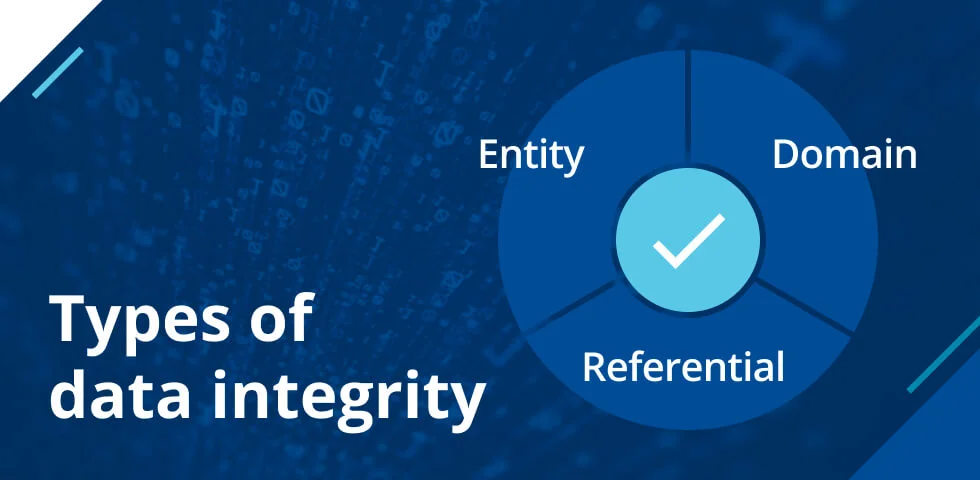
As the volume of data stored within an organization’s IT environment continues to grow exponentially, the task of managing and testing for data integrity becomes more complex. Automated tools can help by eliminating manual processes, increasing accuracy, and reducing the cost of testing. With automated data integrity testing tools, organizations can easily minimize downtime, improve processes, and enable data to inform decision making.
Types of data integrity
Data integrity covers the consistency, accuracy, and correctness of data that’s stored within a database. There are three essential types of data integrity:
- Domain integrity requires that each set of data values/columns falls within a specific permissible defined range. Examples of domain integrity include the correct data format, type, and data length. Additionally, values must fall within the range defined for the system. Domain integrity may also include null status and permitted size values.
- Entity integrity is concerned with non-duplication of records and that each row in a table is uniquely identified. Entity integrity may be enforced by using primary key and foreign key constraints on specific columns.
- Referential integrity is concerned with maintaining the relationships between tables. Referential integrity is often enforced with primary key and foreign key relationships.
Testing for data integrity
Data integrity testing typically involves checks to evaluate several critical characteristics of data, testing for:
- Accuracy – to ensure the data objects correctly represent the values they’re expected to model
- Completeness – to determine that data is not missing
- Conformity – to validate that data conforms to a specific format, to business rules, and to user expectations
- Consistency – to ensure that distinct data instances provide non-conflict information about the same underlying data object
- Integrity – to check whether data is missing important relationship linkages
- Precision – the measurement or classification detail used in specifying an attribute’s domain
- Timeliness – to determine if data is sufficiently up to date
- Uniqueness – to ensure that data for a set of columns is not repeated
Threats to data integrity
Issues with data integrity typically fall into one of several categories:
- Errors resulting from incorrect entry, duplicate data, or accidental deletion are some of the most common threats to data integrity
- Inaccurate data – including incomplete data, redundancy, or unidentifiable sources – prevent organizations from using data to generate precise metrics, models, analyses, and reports, significantly minimizing competitiveness and hindering decision making
- Non-compliance with regulations concerning data protection, privacy, and usage can result in significant penalties
- Security breaches can result in data being stolen, corrupted, or exposed
- Transfer errors – when data is unsuccessfully moved from one location to another – can result in corrupted data and relationships
- Hardware failure may render data incorrectly or incompletely

Data integrity testing tools from Tricentis
Tricentis offers a new and fundamentally different way to manage software testing and data integrity testing. The Tricentis platform is fully automated, codeless, and intelligently driven by AI. Tricentis offers Agile test management and advanced software test automation that’s optimized to support 160+ technologies, including solutions for testing with Jira and for SAP, ServiceNow, Oracle, Snowflake, and Salesforce testing. As the industry’s #1 Continuous Testing platform, Tricentis offers solutions that top any test automation tools list.
Tricentis Data Integrity offers a powerful solution for eliminating data integrity issues before they can cause harm. Offering end-to-end automation, Tricentis covers everything from the integrity of data as it enters a system to the accuracy of integrations, transformations, and migrations.
Tricentis Data Integrity automated testing tools provide:
- End-to end testing across all layers of the data warehouse environment
- Pre-screening testing to facilitate early detection of data errors
- Reconciliation testing that compares sources and targets, and performs row-by-row comparisons of data sets from two different systems
- Vital checks that expose data acquisition errors
- Profiling tests that validate data for logical consistency and correctness from a business perspective
- BI report testing that automates testing of BI reports with checks for fully laid-out reports or analysis of underlying data fed into reports
With Tricentis Data Integrity testing tools, organizations can:
- Reduce the time and cost required to ensure data quality
- Validate data migrations to Snowflake, S/4HANA, and other platforms
- Scale data verification efforts to cover massive amounts of data
- Unify data quality activities occurring across siloed tools
- Monitor data for fraud and regulatory compliance issues
- Ensure that data is not negatively impacted by application updates

